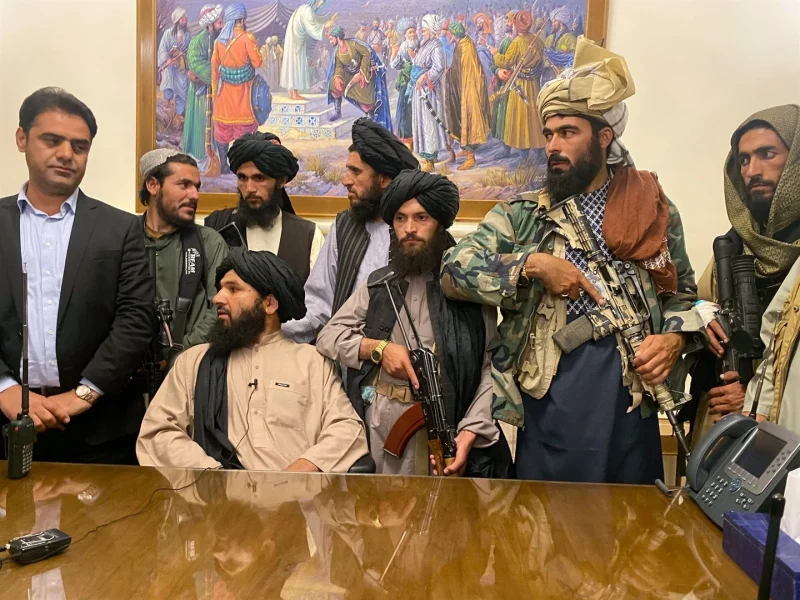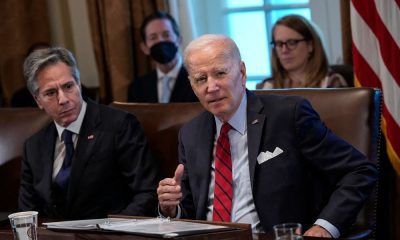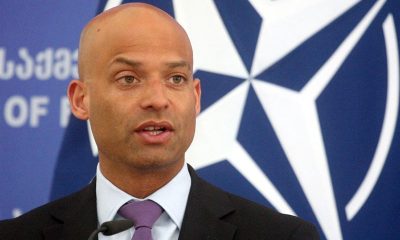Diplomacy
Biden and Xi Prepare for Crucial Call Amid Rising U.S.-China Tensions

Leaders to Discuss Ukraine, Taiwan, and Global Stability as Geopolitical Rivalry Intensifies
The United States and China are preparing for a high-stakes call between President Joe Biden and Chinese President Xi Jinping in the coming days. The anticipated conversation marks the latest attempt by both nations to manage their increasingly complex relationship, one fraught with geopolitical challenges ranging from Ukraine to Taiwan. The call, according to sources familiar with the discussions, follows their last dialogue in April 2024 and a pivotal face-to-face meeting in California in late 2023.
U.S. Secretary of State Antony Blinken, in remarks following his recent talks with Chinese Foreign Minister Wang Yi, underscored the need to preserve open lines of communication between the two superpowers. “We also agreed on the importance of the leaders communicating,” Blinken told reporters, signaling that both nations recognize the value of dialogue even amid heightened tensions.
Ukraine: A Growing Divide
A key issue expected to dominate the Biden-Xi call is China’s material support for Russia’s war in Ukraine. For U.S. officials, China’s role in bolstering Russia’s military capabilities — particularly through the provision of drones — has emerged as a source of deep concern. During a briefing, Deputy Secretary of State Kurt Campbell highlighted how Chinese firms have facilitated Moscow’s battlefield gains, complicating efforts by the West to support Ukraine’s defense.
“What we’ve seen over the past two years is Russia’s rapid reconstitution of its military,” Campbell noted, citing China’s involvement as a critical factor in Russia’s military revival. This support, coupled with aid from North Korea and Iran, has allowed Russia to maintain its aggressive posture in Ukraine, fueling fears of prolonged conflict. “Now we’re in a situation where Russia is seeking to change the territorial lines of Europe, and the fact that China is backing this so substantially is a topic of real concern,” Campbell added.
For Washington, the Biden-Xi call offers an opportunity to press China to reconsider its support for Moscow, while acknowledging the delicate balance required to prevent further escalation. As Campbell pointed out, the U.S. does not seek to “contain or constrain China,” but aims to ensure that competition between the two powers remains “stable and does not trend to conflict.”
Taiwan: The Perennial Flashpoint
Compounding the challenges in the U.S.-China relationship is the ongoing issue of Taiwan. As China marks the 75th anniversary of Communist Party rule, President Xi reiterated his party’s commitment to the “reunification” of Taiwan with mainland China. During a recent reception in Beijing, Xi framed this objective as an unstoppable force of history, declaring that “the wheel of history will not be stopped by any individual or any force.”
Xi’s remarks underscore China’s long-standing insistence that Taiwan, a self-ruled democracy since 1949, must eventually fall under Beijing’s control. For decades, however, the U.S. has sought to balance its diplomatic recognition of Beijing with a firm commitment to Taiwan’s defense, as outlined in the 1979 Taiwan Relations Act. This delicate balancing act has become increasingly fraught as China ramps up political and military pressure on the island.
In response to China’s mounting aggression, President Biden recently approved $567 million in defense assistance for Taiwan. This decision, announced on Sunday, signals Washington’s ongoing support for Taiwan amid Beijing’s growing threats. “Make no mistake, the U.S. is fully, fully, fully supportive of Israel and Taiwan,” Biden said, reaffirming America’s strategic commitments.
Unsurprisingly, China reacted strongly to the latest U.S. arms transfer. Lin Jian, a spokesperson for China’s Ministry of Foreign Affairs, warned that continued U.S. support for Taiwan would not sway Beijing’s resolve. “No matter how many weapons the United States provides to Taiwan,” Lin said, “it will not shake the Beijing government’s determination to defend national sovereignty and territorial integrity.”
Diplomacy in a Shifting Global Order
As Biden and Xi prepare for their next conversation, the stakes are high. Beyond Ukraine and Taiwan, both leaders are expected to address a range of global issues where cooperation is crucial — from managing artificial intelligence risks to combatting fentanyl trafficking.
Despite their differences, U.S. officials continue to emphasize the need for diplomatic engagement. Blinken, reflecting on his discussions with Chinese counterparts, noted that maintaining dialogue between Washington and Beijing is essential for global stability. “We’re committed to finding common ground where we can,” he said, even as rivalry defines much of the current relationship.
For President Biden, the upcoming call represents not just a test of his administration’s ability to navigate one of the world’s most consequential bilateral relationships, but also an opportunity to shape the future of U.S.-China dynamics. As the leaders of the world’s two largest economies engage in what could be a defining moment, the question remains: can the competition be managed, or will it spiral toward deeper conflict?
Diplomacy
Eritrea: Washington’s Strategic Opportunity in the Volatile Horn of Africa

As tensions rise in the Horn of Africa, Eritrea emerges as a potential U.S. partner to counter regional instability and foreign influence.
Eritrea, often labeled Africa’s most authoritarian state, is paradoxically one of the Horn of Africa’s most stable nations. Its geostrategic location along the Red Sea positions it as a critical potential ally for the United States in addressing regional instability and countering the influence of China, Russia, and Iran. The Trump administration’s return to the White House presents an opportunity to recalibrate U.S. foreign policy in the region and engage with Eritrea pragmatically, aligning Washington’s geopolitical interests with the realities on the ground.
Eritrea’s location offers unparalleled advantages in the Horn of Africa. A U.S. military base in cities like Assab, Massawa, or Tio could provide Washington with enhanced access to the Red Sea, allowing it to secure shipping routes, counter piracy, and disrupt Houthi activities destabilizing international trade. Eritrea’s proximity to Yemen also positions it as a valuable asset in countering Iranian influence and mitigating the Houthi threat.
Historically, Eritrea’s leadership, under President Isaias Afwerki, has navigated regional complexities with pragmatism. While authoritarian, the Eritrean government has demonstrated an ability to maintain stability amid the chaos engulfing its neighbors, including Sudan, Ethiopia, and Somalia.
Eritrea’s authoritarianism has shielded it from the ethnic and political fractures that destabilize other Horn nations. While the country shares historical ties with China, dating back to Afwerki’s education during the Cultural Revolution, its alliances are largely transactional and ripe for redefinition.
Washington can capitalize on this transactional nature by fostering a partnership that addresses shared security and economic goals. Eritrea’s military capabilities and centralized governance offer a foundation for collaboration, particularly in countering threats like piracy, terrorism, and regional insurgencies.
A U.S. presence in Eritrea would serve as a counterbalance to these influences, reinforcing Washington’s foothold in the region. Revisiting historical precedents, such as the Cold War-era Kagnew Station, provides a blueprint for establishing a lasting partnership that aligns with U.S. geoeconomic and geopolitical objectives.
Afwerki’s regime may be nearing its conclusion, presenting an opportunity for Washington to engage Eritrea’s ruling party, the People’s Front for Democracy and Justice (PFDJ), in shaping a post-Afwerki future. While Eritrea is unlikely to adopt Western democratic governance, incremental reforms—similar to China’s economic liberalization under Deng Xiaoping—could align its development with U.S. interests.
By fostering economic development, privatization, and integration into global markets, the U.S. could support Eritrea’s transition while securing a strategic partnership that stabilizes the Horn of Africa.
Eritrea’s unique stability amidst regional volatility makes it a critical partner in advancing U.S. interests in the Horn of Africa. A pragmatic approach—grounded in shared security and economic objectives rather than ideological preconditions—offers the best path forward.
As Washington confronts the realities of rising Chinese and Russian influence, regional instability, and the destabilizing effects of Iranian-backed Houthi activities, Eritrea presents a rare opportunity to reshape U.S. engagement in East Africa. The question remains whether the U.S. will seize this moment to turn suspicion into strategic collaboration, ensuring its dominance in one of the world’s most volatile yet vital regions.
Diplomacy
U.S.-Somaliland security talks highlight strategic collaboration

On Tuesday, Somaliland President Muse Bihi Abdi hosted U.S. Ambassador to Somalia Richard H. Riley and Major General Brian T. Cashman, Commander of the Combined Joint Task Force – Horn of Africa, for a meeting in Hargeisa. Discussions at the presidential palace centered on bolstering security cooperation and exploring new partnerships in the Horn of Africa.
Key Highlights:
Commitment to Regional Stability:
President Muse Bihi emphasized Somaliland’s dedication to peace and security, framing the visit as a milestone in U.S.-Somaliland relations.
The U.S. delegation praised Somaliland’s peaceful, democratic elections, commending both outgoing President Bihi and President-elect Abdirahman Mohamed Abdullahi Irro.

Strategic Importance of Berbera:
Talks reportedly focused on Berbera, a port city with growing significance due to DP World’s investments and its role in regional trade.
Berbera’s port and airfield have drawn AFRICOM’s attention, fueling speculation about a possible U.S. military presence.
Geopolitical Context:
The U.S. engagement with Somaliland aligns with provisions in the 2024 National Defense Authorization Act (NDAA), which supports potential partnerships with Somaliland.
Analysts view this as part of Washington’s strategy to counter Iran and the Houthis in Yemen, as well as Chinese and Russian influence in the Gulf of Aden and Red Sea.
Somaliland’s Position:
Since its 1991 declaration of independence from Somalia, Somaliland has functioned as its own government, military, and a track record of stability. However, the lack of international recognition limits its access to global platforms and institutions.
This meeting underscores Somaliland’s growing importance in U.S. efforts to enhance regional security and stability, leveraging its strategic position and democratic governance amidst complex geopolitical challenges in the Horn of Africa.
Diplomacy
Russia’s Ambassador to the U.S. Ends Term at Time of Turmoil

Russia’s Ambassador to the U.S., Anatoly Antonov, has concluded his tenure and returned to Moscow amid one of the most strained periods in U.S.-Russia relations in decades. Antonov, a career diplomat and Kremlin hard-liner, served as Russia’s top envoy in Washington since 2017, a role defined by his steadfast support of Russia’s actions in Ukraine. His departure comes against the backdrop of Moscow’s ongoing war in Ukraine and heightened tensions with Washington, evoking memories of Cold War-era hostilities.
Born in Siberia and known for his uncompromising stance, Antonov had built a reputation as a tough negotiator throughout his decades-long career. Despite his hawkish leanings, he was recognized for his ability to secure compromises, particularly in the realm of arms control—a field in which he had significant expertise before moving to Washington. Yet, in the context of Russia’s invasion of Ukraine, Antonov’s statements revealed his firm alignment with the Kremlin’s military and diplomatic agenda.
“It is obvious to us that the enemy will be defeated and victory will be Russia’s,” Antonov wrote recently on Telegram, underscoring his commitment to President Vladimir Putin’s narrative surrounding the conflict in Ukraine. His tenure reflected Moscow’s increasingly adversarial stance, especially as relations with the West deteriorated following Russia’s 2022 invasion of its neighbor.
Since 2022, the U.S. and its NATO allies have been at odds with Moscow, supporting Kyiv in what they describe as a defense against an imperialistic land grab. Russia, however, has labeled its invasion a “special military operation” and accuses the West of orchestrating a proxy war to undermine Russian sovereignty. The crisis has drawn comparisons to the Cuban missile standoff of 1962, marking a significant low point in U.S.-Russia relations.
Antonov’s departure also signals the end of an era in Russia’s diplomatic strategy in Washington. Sanctioned by the European Union in 2014 following Russia’s annexation of Crimea, Antonov was well-versed in the long-standing points of contention between Russia and the West. His influence on arms control negotiations, which he described as a pragmatic “write-down” exercise to align divergent interests, made him a central figure in efforts to maintain open lines of communication.
In the absence of a named successor, it remains unclear how Russia’s diplomatic posture in Washington will evolve. Antonov’s exit coincides with ongoing geopolitical challenges for Moscow and intensifying scrutiny of its role on the global stage. As both nations continue to navigate an uncertain future, Antonov’s legacy will be remembered as one forged in the crucible of a deepening crisis.
Diplomacy
Taliban Face Diplomatic Fallout Over ‘Disrespect’ of Host Nations’ National Anthems

Pakistan and Iran rebuke the Taliban for violating diplomatic norms as ideological conflicts overshadow regional relations.
The Taliban’s strict adherence to their interpretation of Islamic law has once again landed them in international controversy, this time for their perceived disrespect of national anthems during official ceremonies in Pakistan and Iran. The incidents have triggered sharp reactions from both countries, highlighting the growing tension between the Taliban’s ideological stance and the diplomatic norms expected in international relations.
The first incident occurred in Pakistan when Mohibullah Shakir, the Taliban consul general in Peshawar, remained seated during the Pakistani national anthem at an official event. His refusal to stand sparked public outrage, with calls for his expulsion from the country. Pakistan swiftly lodged an official complaint, terming the act “reprehensible” and a violation of diplomatic etiquette. The Taliban defended Shakir’s actions, citing their religious beliefs that forbid music, claiming the diplomat was acting in line with Sharia.
Similarly, in Iran, Azizurrahman Mansour, a Taliban deputy minister, remained seated during the Iranian national anthem at an Islamic Unity Conference, which drew immediate condemnation. The Iranian government summoned the Taliban’s acting ambassador for an explanation, further escalating tensions.
Both incidents have been defended by the Taliban based on their interpretation of Islamic law, which prohibits the playing of music, including national anthems. The Taliban’s explanation, however, failed to placate either Pakistan or Iran, both of which see the refusal to stand as a breach of diplomatic norms.
Pakistan, historically a key ally of the Taliban, reacted swiftly and strongly to the incident. Islamabad expressed its “strong displeasure” through diplomatic channels, with Foreign Ministry spokesperson Mumtaz Baloch rejecting the Taliban’s explanation and emphasizing that diplomatic norms must be respected, regardless of ideological differences. This incident comes at a time when Pakistan’s relationship with the Taliban is already under strain due to issues such as cross-border terrorism and the Taliban’s influence on extremist factions within Pakistan.
Pakistan, a majority Sunni Muslim nation, has often been seen as a supporter of the Taliban’s rise to power, but this episode has further strained ties between the two, as Islamabad faces internal pressures and public outrage over the disrespect shown to its national symbols.
In Iran, the backlash against Mansour’s actions reflects deeper sectarian and ideological divisions. Iran, a majority Shiite Muslim nation, has long had a fraught relationship with the Sunni-dominated Taliban. While Tehran has engaged diplomatically with the Taliban, incidents like this highlight the ideological chasm between the two.
Hassan Kazemi Qomi, Iran’s special envoy for Afghanistan, dismissed the Taliban’s explanation, arguing that their justification lacked logic, since standing for an anthem is not necessarily equivalent to endorsing music. Prominent Iranian figures, such as Mohammad Ali Abtahi, criticized the Taliban’s ideological rigidity, warning that such attitudes are more dangerous than their military arsenal. Abtahi’s comments reflect a growing frustration within Iran that the Taliban’s interpretation of Islam could destabilize efforts for unity among Muslim nations.
At the heart of the controversy is the Taliban’s interpretation of Sharia law and its rigid enforcement of ideological purity over diplomatic courtesies. This ideological stance often puts the Taliban at odds with the international community, particularly in situations where religious customs conflict with established diplomatic protocols. Their refusal to stand for national anthems, based on religious grounds, demonstrates how the Taliban prioritize their interpretation of Islam over universally accepted diplomatic practices.
This incident is emblematic of a larger issue: the challenge the Taliban face in balancing their religious beliefs with the requirements of engaging diplomatically with other nations. While the Taliban have attempted to normalize relations with neighboring countries, their ideological rigidity creates frequent friction.
These incidents are likely to exacerbate existing tensions between the Taliban and its neighbors. Pakistan, which has provided political and, at times, military support to the Taliban, may find its relationship with Afghanistan’s de facto government further strained. Already facing security concerns due to the resurgence of extremist groups along the Afghan border, Pakistan cannot afford further diplomatic rifts with the Taliban.
Iran, while maintaining some level of engagement with the Taliban, will likely view this incident as a setback in fostering regional cooperation. Sectarian differences, compounded by the Taliban’s refusal to adhere to diplomatic norms, could impede Iran’s efforts to build more constructive relations with the Taliban, especially on matters of regional security and counterterrorism.
The diplomatic fallout from these incidents highlights the broader challenge the Taliban face in gaining international recognition. No country, including Pakistan or Iran, has officially recognized the Taliban as the legitimate government of Afghanistan, largely due to their harsh policies, particularly toward women and girls. These episodes of diplomatic disrespect further complicate the Taliban’s attempts to present themselves as a viable and responsible governing entity on the global stage.
Western governments, already critical of the Taliban’s human rights record, are unlikely to overlook these incidents. The Taliban’s failure to adhere to basic diplomatic norms reinforces the perception that they are unwilling—or unable—to operate within the frameworks of modern international relations.
The Taliban’s refusal to respect host nations’ anthems reflects the deeper ideological divides that make their integration into the global diplomatic system so challenging. As they continue to navigate their role in regional politics, these incidents will likely fuel calls for greater diplomatic isolation unless the Taliban show a willingness to adapt to international norms.
For Pakistan and Iran, the Taliban’s actions represent more than a simple breach of protocol—they reveal the broader ideological tensions that make sustained cooperation difficult. Moving forward, the Taliban will need to reconcile their religious convictions with the demands of international diplomacy if they hope to avoid further backlash and deepen ties with their neighbors.
Diplomacy
Western Diplomatic Scramble to Prevent Middle East Explosion

Diplomacy
France and Ethiopia Forge Stronger Ties Amidst Regional Shifts

High-Level Diplomatic Talks Highlight Ethiopia’s Strategic Role and the Future of Franco-Ethiopian Relations.
Ethiopia’s Foreign Minister, Ambassador Taye Atske-Selassie, engaged with a prominent French delegation led by Senator Hugues Saury, President of the Horn of Africa Friendship Group of the French Parliament. This meeting underscored the deep and enduring relationship between Ethiopia and France, reflecting both nations’ mutual interest in enhancing their cooperation.
Minister Taye Atske-Selassie highlighted the robust and longstanding diplomatic bonds between Ethiopia and France, noting the thriving collaboration in development, trade, investment, and cultural exchanges. He underscored Ethiopia’s pivotal role in the Horn of Africa, a region of strategic geopolitical importance that commands global attention due to its dynamic socio-economic landscape and security challenges.
One key topic of discussion was Ethiopia’s need for sustainable access to the sea. As Ethiopia’s population and economy continue to expand rapidly, Minister Taye emphasized the importance of ensuring maritime access through peaceful negotiations and mutual agreements. This issue is critical for Ethiopia’s economic growth and regional stability.
The conversation also turned to the future of Somalia, especially in the context of the post-ATMIS (African Union Transition Mission in Somalia) scenario. Minister Taye stressed the importance of considering a multinational peacekeeping force to address the ongoing security concerns in Somalia. This move, he suggested, would be vital in maintaining stability in the region.
Senator Hugues Saury, representing France in this high-level dialogue, affirmed Ethiopia’s role as a cornerstone in regional and continental affairs. He expressed a commitment to strengthening the bilateral relations between France and Ethiopia, acknowledging the necessity of collaborative efforts between the two governments to further enhance their partnership.
Senator Saury, who is also the Secretary of the French Senate’s Committee on Foreign Affairs, Defence, and Armed Forces, was accompanied by a notable delegation, including France’s Ambassador to Ethiopia, H.E. Ambassador Alexis Lamek, and other key members of the Horn of Africa Friendship Group. The delegation comprised Vice-Presidents Senator Raphaël Daubet and Senator Laurence Harribey, Secretary Mr. Xavier Dupriez, and First Secretary Charlelie Marie.
This meeting not only reinforced the strong ties between Ethiopia and France but also highlighted the shared commitment to addressing regional challenges and promoting stability. As both nations navigate the complexities of regional politics and international diplomacy, their partnership remains a critical factor in shaping the future of the Horn of Africa.
Diplomacy
India’s Emerging Nexus with Somaliland: A Strategic and Historical Perspective

Diplomacy
A New Era in US-UK Relations Amidst Global Crises

As Antony Blinken Meets the New U.K. Government, Key Topics Include Ukraine, the Middle East, and Shifting Alliances
U.S. Secretary of State Antony Blinken’s arrival in London this week signals a significant moment in the evolving landscape of US-UK relations. Arriving late Monday, Blinken is set to engage in high-stakes diplomacy with the new U.K. government, led by Prime Minister Keir Starmer, whose Labour Party swept into power in July, ending 14 years of Conservative rule.
Blinken’s visit, the highest-level American diplomatic engagement in London since Labour’s ascent, comes as a crucial opportunity for both nations to recalibrate their global strategies. Expected to meet with Starmer and Foreign Secretary David Lammy on Tuesday, Blinken’s discussions will cover critical issues, including the ongoing conflict in Ukraine, tensions in the Middle East, and broader geopolitical concerns in Asia.
The timing of Blinken’s visit is particularly notable as Prime Minister Starmer prepares for his own trip to Washington later this week. This upcoming visit to the White House will be Starmer’s second meeting with President Biden, reflecting the deepening ties between the new Labour government and the United States.
While the US and the UK have historically aligned closely on global issues, Starmer’s government is introducing nuanced changes in foreign policy that could reshape their partnership. Notably, Starmer has signaled a tougher stance on Israel, diverging from his predecessor’s approach. His administration recently suspended certain arms shipments to Israel, citing concerns over potential violations of humanitarian law. This decision marks a significant shift in U.K. policy, reflecting Starmer’s commitment to a more critical stance on Israel’s actions.
The Labour government’s decision to abandon the Conservative plan to challenge the International Criminal Court’s (ICC) bid to arrest Israeli Prime Minister Benjamin Netanyahu further underscores this shift. The United States, which is not an ICC member and opposes international efforts to prosecute Israeli leaders, has refrained from criticizing the U.K. decision, highlighting the intricate balance of diplomatic relations.
This week’s discussions will also delve into the ongoing support for Ukraine as it continues to resist Russian aggression. Both the US and the UK have been key allies in providing support to Ukraine, and Starmer’s administration has committed to maintaining a robust stance against Russia’s invasion. The partnership on Ukraine will likely be a central theme of Blinken’s talks, reinforcing the transatlantic alliance’s unified approach to the crisis.
In addition to Ukraine and the Middle East, the talks will touch on broader geopolitical issues, including the evolving dynamics in Asia. The U.S. and U.K. cooperation in these areas underscores their shared interests and the need for a coordinated strategy in addressing global challenges.
As Blinken and Starmer prepare for their respective meetings, the focus will be on ensuring that their collaborative efforts continue to address pressing global issues while navigating the shifting tides of international diplomacy. This visit represents a pivotal moment in reinforcing the US-UK alliance and setting the stage for future diplomatic engagements.
-

 Africa9 months ago
Africa9 months agoHow Somaliland Could Lead the Global Camel Milk Industry
-

 Top stories9 months ago
Top stories9 months agoIsrael Announces Plans to Reopen Border Crossings: The Latest Developments
-

 Editor's Pick10 months ago
Editor's Pick10 months agoHow the Greatest Hacker Manipulated Everyon
-

 Analysis9 months ago
Analysis9 months agoIran escalates conflict, attacking Israel; US forces help Israel to intercept Iranian projectiles
-

 Analysis9 months ago
Analysis9 months agoBiden Stands Firm with Israel Amid Iran’s Aggression: A Test of Resilience
-

 Analysis9 months ago
Analysis9 months agoIsrael and Iran on Edge: Tensions Escalate Amidst Rising Threats
-

 Top stories7 months ago
Top stories7 months agoTragedy Strikes Malawi: Vice President Saulos Chilima Among Victims in Fatal Plane Crash
-

 Analysis7 months ago
Analysis7 months agoA New Dawn for Somaliland: Global Recognition Expected by June 2024





























